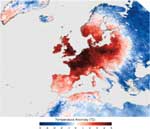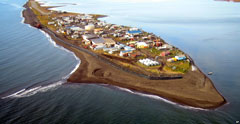 The area of land affected by extreme heatwaves is expected to double by 2020 and quadruple by 2040, and there’s no way we can stop it happening according to a new paper by Dim Coumou and Alexander Robinson – Historic and future increase in the global land area affected by monthly heat extremes (Environmental Research Letters, open access). However, the researchers find that action to cut emissions can prevent further dramatic increases in heat extremes out to the end of the century.
The area of land affected by extreme heatwaves is expected to double by 2020 and quadruple by 2040, and there’s no way we can stop it happening according to a new paper by Dim Coumou and Alexander Robinson – Historic and future increase in the global land area affected by monthly heat extremes (Environmental Research Letters, open access). However, the researchers find that action to cut emissions can prevent further dramatic increases in heat extremes out to the end of the century.
The paper’s made headlines around the world — see The Guardian, Independent, and Climate Central — most focussing on the inevitability of more, and more intense, heat events in the near future. Dana Nuccitelli at The Guardian provides an excellent discussion of the science behind the new paper so, to avoid reinventing the wheel, I’m going to focus on a fascinating chart from the paper, and then ponder the implications for climate policy.
Continue reading “Beatin’ the heat: cut carbon or we’re cooked”

 On Sunday morning, Radio NZ National’s
On Sunday morning, Radio NZ National’s  The news media, with some outstanding exceptions, has monumentally failed to communicate to the public the magnitude of the threat of climate change to human society. Depressed, I tried recently submitting an opinion piece to the Herald dialogue pages on the subject. It was rejected. It’s hardly the sort of thing that needs writing for Hot Topic readers, but there may be interest in seeing what the Herald turns down. And it’s not because they were besieged by material: there were a couple of obvious fillers from overseas newspapers to occupy the space in the same week. Here it is:
The news media, with some outstanding exceptions, has monumentally failed to communicate to the public the magnitude of the threat of climate change to human society. Depressed, I tried recently submitting an opinion piece to the Herald dialogue pages on the subject. It was rejected. It’s hardly the sort of thing that needs writing for Hot Topic readers, but there may be interest in seeing what the Herald turns down. And it’s not because they were besieged by material: there were a couple of obvious fillers from overseas newspapers to occupy the space in the same week. Here it is: Following the
Following the 